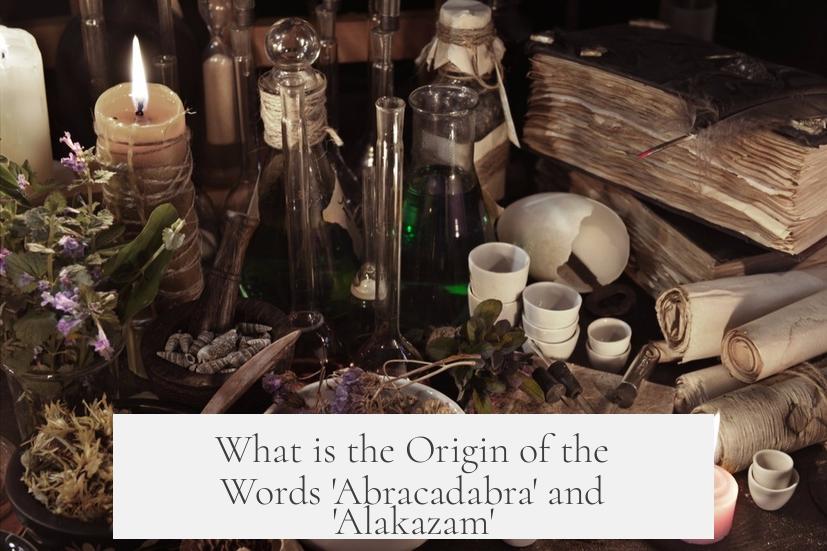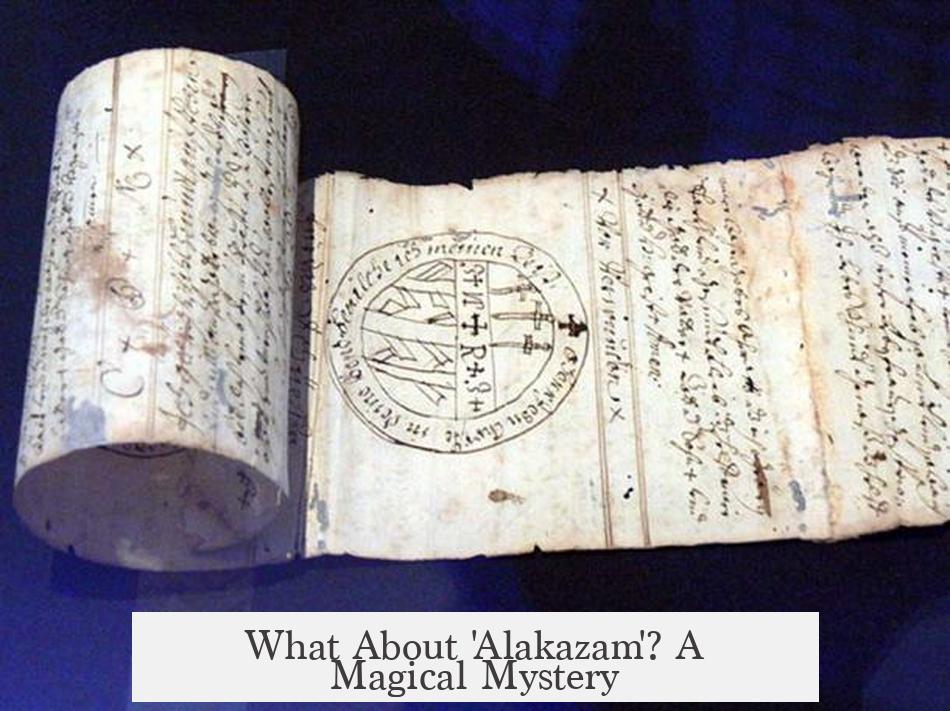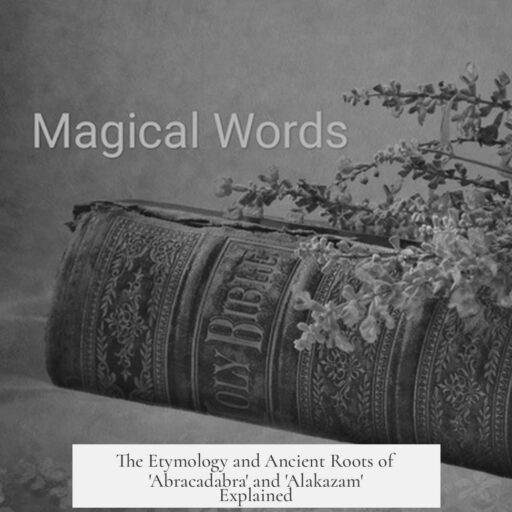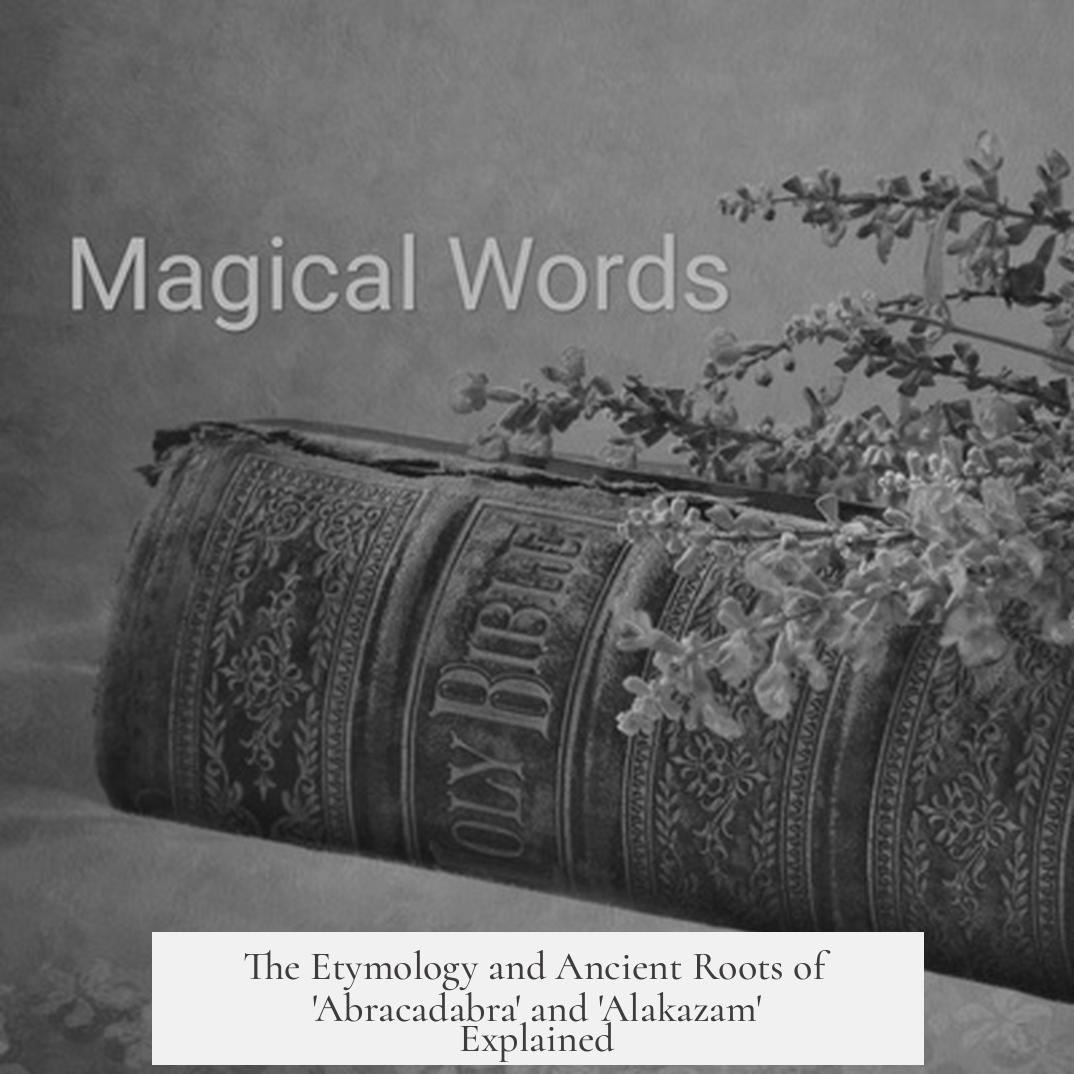The words “abracadabra” and “alakazam” originate from ancient traditions of magical language, used as charms or spells with the power to protect or heal.
“Abracadabra” first appears in the 2nd century CE, attributed to Q. Severus Sammonicus. It stems from Latin and Late Greek origins, specifically from the word “Abraxas.” Abraxas was a cabalistic or Gnostic term for a supreme deity, imbued with mystical significance. Historically, “abracadabra” was written in a triangular pattern on amulets worn around the neck. This pattern was believed to ward off diseases and evil spirits. The word’s connection to divine power reflects early magical practices rooted in a blend of language and spirituality.
“Alakazam,” by contrast, emerged much later and has a less clear origin. First recorded in 1937, it is considered a nonsense word. Unlike “abracadabra,” which carries historical and religious connotations, “alakazam” functions mainly as a magical incantation without known linguistic roots or meaning. It gained popularity in the 20th century, especially in popular culture and stage magic, as a generic formula to signify sudden magic or transformation.
Both words relate to a broader tradition of using language believed to contain intrinsic power. This tradition traces back to Aramaic and Hebrew terms believed to have protective or healing value. Magical practitioners in antiquity and medieval Europe used sacred names like “Sabaoth,” “Adonay,” and “Yhvh,” which are names of the divine in Hebrew. These helped convey a profound spiritual authority, ensuring safety or curing illness. Over time, this belief extended to other languages, including Latin, Greek, Arabic, and Syriac, where random or constructed magical words emerged.
Many such words and phrases once existed. However, “abracadabra” and “alakazam” remain the most recognizable due to their cultural persistence. While “abracadabra” links directly to ancient spiritual contexts, “alakazam” serves as an imaginative modern echo of magical speech.
- “Abracadabra” dates back to 2nd-century Latin and Greek with divine significance.
- “Alakazam” is a 20th-century invented magic word with unclear origins.
- Both relate to traditions of magical language from Aramaic and Hebrew charms.
- These words reflect beliefs in the protective power of sacred and magical names.
What is the Origin of the Words ‘Abracadabra’ and ‘Alakazam’?

If you’ve ever watched a magic show or muttered a “hocus pocus” incantation, you’ve likely come face to face with the words abracadabra and alakazam. But where do these mystical-sounding words come from? What secret powers lie behind their origins?
Let’s cut through the smoke and mirrors and explore the fascinating etymology—the origin and historical development—of these classic magic words.
What Is Etymology, Anyway?
First things first: etymology is the study of a word’s origin and how it has changed over time. Every big dictionary worth its salt offers some etymology, usually showing you where the word comes from, sometimes centuries back. If you’re a language nerd (or just curious), there are entire dictionaries devoted solely to etymology.
Knowing a word’s etymology is like tracing its family tree. It helps us understand how meaning and usage have evolved, often revealing surprising stories about culture, history, and belief systems.
Decoding ‘Abracadabra’: More Than Just a Magical Sound
The word “abracadabra” might sound like it came straight from a magician’s hat, but it’s actually quite ancient and has intriguing roots. First recorded as a magical formula in the 1690s, its history goes back much further—around the 2nd century CE, thanks to a Roman physician named Quintus Severus Sammonicus.
Sammonicus recommended writing the word in a triangular pattern on amulets worn around the neck, believing it protected the wearer from illness. This shows abracadabra wasn’t just magic fluff—it had a serious charm function in ancient medicine.
So, where does the word itself come from? Abracadabra traces its roots to the Late Greek word Abraxas, which was a cabalistic or gnostic name for the supreme deity. This wasn’t your average god name; Abraxas was considered a word of power, imbued with mystical significance in ancient spiritual traditions.
The triangular arrangement of abracadabra may have symbolized a powerful invocation of this divine concept. How cool is that? It’s like carrying a tiny ancient spell for protection around your neck!
Interestingly, abracadabra wasn’t alone in this magical word club. Historical texts from the mid-15th century mention another magical word: ananizapta. Like abracadabra, ananizapta was considered a charm, often used to ward off ailments or evil spirits. Though it’s less famous today, it shows how widespread the practice of using special sounds or words was to invoke magical protection.
What About ‘Alakazam’? A Magical Mystery

While abracadabra has a documented ancient lineage, alakazam remains more elusive. It’s typically classified as a nonsense word of obscure origin. The first recorded use in English dates to 1937, meaning it’s a relatively modern addition to the magical vocab.
So, if abracadabra comes with historical heft, alakazam is more like the sprightly new kid on the block in the world of magic words. It carries a whimsical, playful energy that magicians love—easy to shout with flair and perfect for capturing attention.
Though its etymology is unclear, alakazam fits into a long tradition of magical words serving as verbal sparks. Remember, not every magic word needs to have deep historical roots. Sometimes, the mystery itself fuels the magic.
Ancient Languages and the Magic of Words
Want to hear a secret? Many magical words stem from languages like Aramaic and Hebrew, which were believed to hold special powers. These languages were seen as the tongues of divine or supernatural forces, so words from them were thought to work better as charms or magical protections.
This belief wasn’t just a medieval superstition. In antiquity, many people used Hebrew names of divinity such as Sabaoth, Adonay, or Yhvh as talismans to ward off harm or illness. The logic? Holy names held power and could act as shields.
Fast forward to medieval and early modern Europe, and this idea expanded. Magical healers and cunning folk began incorporating bits of Hebrew, Latin, Greek, Arabic, and Syriac into their charms and spells. They mixed and matched words, combining the sacred and the mysterious to create potent incantations.
Though this practice produced a wealth of magical phrases, only a handful survive today in popular imagination—abracadabra and alakazam being prime examples. These words are like survivors of a linguistic magical arms race, continuing to captivate audiences worldwide.
Why Does This Matter? The Power Behind the Words
Understanding the etymology of abracadabra and alakazam isn’t just an academic exercise—it reveals how humans have long used language to shape belief and influence reality. These words carry centuries of cultural weight, connecting us to ancient hopes, fears, and desires for protection and power.
Plus, it’s fun! Now, when you say “abracadabra,” you aren’t just blabbering nonsense—you’re evoking a name tied to mystery gods and ancient healing magic. And when you shout “alakazam,” you’re tapping into a playful tradition of sound as performance and enchantment.
The next time you see a magician wave a wand, remember they’re echoing linguistic echoes that span millennia. These words are more than sounds; they are cultural artifacts, relics of our lasting fascination with mystery and the invisible forces we hope to command.
Final Thought: Magic Words Are More Than Just for Trickery
So, next time someone asks, “Where does abracadabra come from?” you can confidently say:
“Abracadabra is a magical formula dating back to the 2nd century, derived from the divine name Abraxas in Late Greek, historically used as a charm to ward off sickness. Alakazam, on the other hand, is a playful nonsense word from the 20th century, serving as a modern magical incantation with roots that remain a mystery.”
Both words highlight how language, history, and belief entwine in surprising ways. They remind us that words aren’t just for communication—they’re vessels of meaning, power, and magic.
So, are you ready to wear your abracadabra amulet or shout alakazam for some everyday magic? Either way, now you know the spellbinding stories behind these famous magical words!



